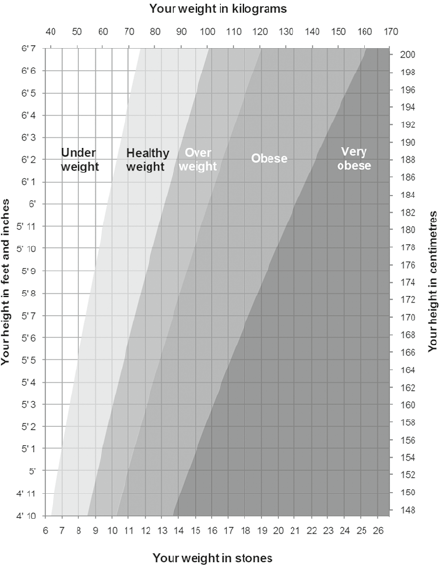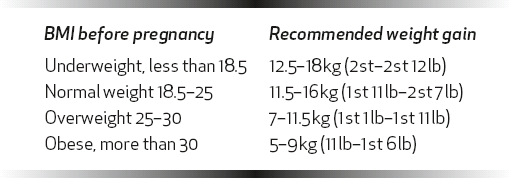How much weight should you gain?
The amount of weight
you should gain during pregnancy depends on your weight before you
became pregnant. Women who are overweight need to gain much less weight
than those who are underweight, to produce a healthy baby. You can find
out if your pre-pregnancy weight was appropriate for your height by
calculating your body mass index (BMI).
Calculating your BMI
By working out your BMI, you can see whether you are a healthy weight for your height.
- Measure your height in metres. To
convert from feet and inches, multiply your height in inches by 0.0254.
For example, if you are 5 ft 2 in, this is 62 inches (12 inches to a
foot), so the calculation is 62 × 0.0254 = 1.57 m.
- Measure your weight in kilograms. To
convert from stones and pounds, multiply your weight in pounds by
0.454. For example, if you weigh 10 stone, this is 140 lb (14 lb to a
stone), so the calculation is 140 × 0.454 = 63.6 kg.
- Divide your weight by your height squared. For example:

For a simpler idea of
whether you were the right weight for your height, use the graph
opposite. First find your height up the side and then your weight along
the top or bottom, depending on whether you work in kilograms or stones
and pounds.
Once you know which weight category you belonged to before you became pregnant.
The recommendations come from the Institute of Medicine in the USA and
they have been calculated using data on weight gain and pregnancy
outcome from thousands of women. Weight gains within the recommended
ranges are associated with the lowest risk of complications during
pregnancy and labour, and the best chances of having a healthy baby
whose birth weight is within the normal healthy range. Weight retention
after having the baby is also factored in, as well as the increased
risk of childhood obesity among babies whose mothers put on a lot of
weight during pregnancy.


You
might have read that you don’t need to gain any weight during the first
trimester (three months) of pregnancy, but in reality most women do put
on a bit. The average gain is about 0.5–2 kg (1–4 lb). If you are
concerned about how much weight you’re putting on and want to monitor
it, it may be easier to think about weekly weight gain, rather than the
total amount. If you were in the underweight or normal weight category
before pregnancy, then you should gain about 0.5 kg (1 lb) per week to
achieve the recommended total gain in the table above. However, if you
were overweight or obese before pregnancy, you should gain about 0.25
kg (0.5 lb) each week.
If you are concerned
about your weight gain, it is important to talk to your midwife or GP.
Remember that there is not an exact amount of weight that you should be
putting on, and women with a range of different weight gains have good
pregnancies and healthy babies.
Knowing what to eat to
achieve a healthy weight gain isn’t always easy, and a growing number
of pregnant women are struggling with weight issues. In 2010, NICE
brought out new guidelines on the topic. Most of the recommendations
are aimed at health professionals, but NICE also give some practical
suggestions for pregnant women. These show what you can do to make it
more likely that you will achieve a healthy weight gain:
- eat breakfast;
- watch portion sizes;
- base meals on starchy foods such as potatoes and rice;
- eat fibre-rich foods, such as oats, wholegrain products and vegetables;
- make sure you get your five-a-day;
- eat a low-fat diet;
- avoid high-fat and high-sugar foods, such as fried food, fast food, fizzy drinks and cakes.
Twins and more!
If you are expecting
twins, triplets or even more babies, you are likely to gain more weight
than a woman expecting just one. This is due not only to the weight of
an extra baby but also to an extra placenta and more amniotic fluid.
You are quite likely to feel particularly hungry in early pregnancy and
gain more weight in the first few months.
The Institute of Medicine in the USA
has also calculated recommended weight gain ranges for women expecting
twins. It describes these guidelines as ‘provisional’ as there is not
as much data available about which weight gains are associated with the
best pregnancy outcomes for twins. However, since there are no other
recommendations available, you might find them useful. If you were
underweight before you became pregnant, you might notice that there is
no recommendation for you in the table below. This is because there was
simply not enough data available for the Institute of Medicine to base
one on. However, you can look at the recommended range for normal
weight women, particularly the upper end of the range (as underweight
women need to gain more), as a rough guide.

There are no
official guidelines regarding additional energy and calorie
requirements for multiple pregnancies. However, extra calories are
needed, and these should come from nutrient-rich foods. These will
supply extra vitamins and minerals, including iron and vitamin A, which
are more likely to be lacking in multiple pregnancies.